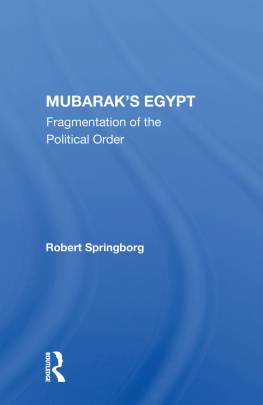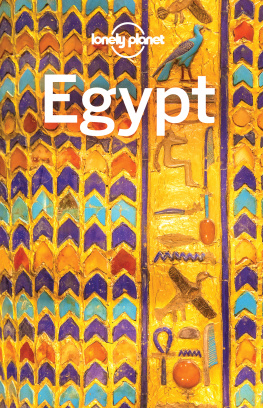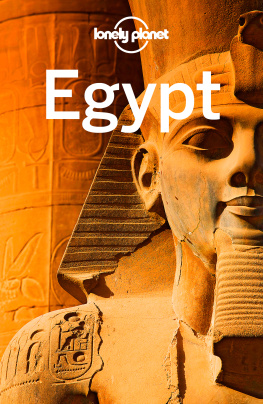Robert Springborg - Egypt
Here you can read online Robert Springborg - Egypt full text of the book (entire story) in english for free. Download pdf and epub, get meaning, cover and reviews about this ebook. year: 2017, genre: Politics. Description of the work, (preface) as well as reviews are available. Best literature library LitArk.com created for fans of good reading and offers a wide selection of genres:
Romance novel
Science fiction
Adventure
Detective
Science
History
Home and family
Prose
Art
Politics
Computer
Non-fiction
Religion
Business
Children
Humor
Choose a favorite category and find really read worthwhile books. Enjoy immersion in the world of imagination, feel the emotions of the characters or learn something new for yourself, make an fascinating discovery.
- Book:Egypt
- Author:
- Genre:
- Year:2017
- Rating:4 / 5
- Favourites:Add to favourites
- Your mark:
- 80
- 1
- 2
- 3
- 4
- 5
Egypt: summary, description and annotation
We offer to read an annotation, description, summary or preface (depends on what the author of the book "Egypt" wrote himself). If you haven't found the necessary information about the book — write in the comments, we will try to find it.
Egypt — read online for free the complete book (whole text) full work
Below is the text of the book, divided by pages. System saving the place of the last page read, allows you to conveniently read the book "Egypt" online for free, without having to search again every time where you left off. Put a bookmark, and you can go to the page where you finished reading at any time.
Font size:
Interval:
Bookmark:

Hot Spots in Global Politics Series
- Samer Abboud, Syria
- Christoph Bluth, Korea
- Alan Dowty, Israel/Palestine, 4th edition
- Kidane Mengisteab, The Horn of Africa
- Amalendu Misra, Afghanistan
- Gareth Stansfield, Iraq, 2nd edition
- Jonathan Tonge, Northern Ireland
- Thomas Turner, Congo

Copyright Robert Springborg 2018
The right of Robert Springborg to be identified as Author of this Work has been asserted in accordance with the UK Copyright, Designs and Patents Act 1988.
First published in 2018 by Polity Press
Polity Press
65 Bridge Street
Cambridge CB2 1UR, UK
Polity Press
101 Station Landing
Suite 300
Medford, MA 02155, USA
All rights reserved. Except for the quotation of short passages for the purpose of criticism and review, no part of this publication may be reproduced, stored in a retrieval system or transmitted, in any form or by any means, electronic, mechanical, photocopying, recording or otherwise, without the prior permission of the publisher.
ISBN-13: 978-1-5095-2048-0
ISBN-13: 978-1-5095-2049-7(pb)
A catalogue record for this book is available from the British Library.
Library of Congress Cataloging-in-Publication Data
Names: Springborg, Robert, author.
Title: Egypt / Robert Springborg.
Other titles: Hot spots in global politics.
Description: Malden, MA : Polity Press, 2017. | Series: Hot spots series | Includes bibliographical references and index.
Identifiers: LCCN 2017007693 (print) | LCCN 2017010789 (ebook) | ISBN 9781509520480 (hardback) | ISBN 9781509520497 (pbk.) | ISBN 9781509520510 (Mobi) | ISBN 9781509520527 (Epub)
Subjects: LCSH: EgyptPolitics and government1981- | Political cultureEgypt.
Classification: LCC DT107.88 .S67 2017 (print) | LCC DT107.88 (ebook) | DDC 962.056dc23
LC record available at https://lccn.loc.gov/2017007693
Typeset in 10.5 on 12 pt Sabon by Toppan Best-set Premedia Limited
Printed and bound in Great Britain by Clays Ltd, St Ives PLC
The publisher has used its best endeavours to ensure that the URLs for external websites referred to in this book are correct and active at the time of going to press. However, the publisher has no responsibility for the websites and can make no guarantee that a site will remain live or that the content is or will remain appropriate.
Every effort has been made to trace all copyright holders, but if any have been inadvertently overlooked the publisher will be pleased to include any necessary credits in any subsequent reprint or edition.
For further information on Polity, visit our website: politybooks.com
FOR ZIYAD AND GEORGE, LEYLA AND LUKE
Egypt, China, and Iran are the three great empires of antiquity that exist today as nation states, the sovereignty of which extends over much the same territory ruled by those ancient empires. This remarkable durability attests to the special if not unique natures of both rulers and ruled in these countries. Those ruling have been able to assert their authority and claim on loyalties for millennia, while the ruled have shared sufficient in common to remain united as political communities over this longue dure.
Egypt is especially remarkable in these regards, reflecting the unique unifying force of the Nile River. Relative ease of communication and transportation, combined with remarkably fertile arable land, enabled successive governments to organize and control populations and to extract the resources necessary to sustain centralized government. Further benefits to the state and its peoples derived from Egypt's strategic location at the junction of two continents and the gateway to a third. Since Roman times trade between Asia and Europe has passed through Egypt. The most important legacies of Egyptians having been governed as a united people over millennia have been a sense of common national identity combined with loyalty to political community and the institutions governing it.
Given this extraordinary record of national endurance and unity it would seem rash to even speculate that Egypt's contemporary nation state is at risk of fracturing. Yet, the pressures to which it is currently subjected and which are bound to intensify are already straining the ties that hold the political community together, while rendering ever more difficult the task of governing it. As Egyptians become steadily more divided by class, religion, region, ethnicity, gender, and contrasting views of how, by whom, and for what purposes they should be governed, so do their rulers become ever more fearful, repressive, and unrepresentative. Caught in a downward spiral in which poor governance is both cause and consequence of mounting political, economic, environmental, regional, and other pressures, Egypt is facing a future so uncertain that it could come to resemble neighboring countries that have essentially collapsed under similar loads, albeit having had weaker states to bear them.
Egypt, in sum, is not just a temporary hotspot, it is an exemplar of a broader trend in the Middle East and North Africa (hereafter, MENA) of the collapse of political orders and of the economies, environmental resources, and societies upon which those orders have been based. No small political changes, such as replacement of Egypt's President Abd al Fattah al Sisi by another general, or even by a civilian so long as he remains subordinate to the existing power structures, will arrest the decline. So Egypt exemplifies a broader problem and in that sense is a hotspot, but not one that is going to cool any time soon.
This book will seek to explain how a country with such a long and impressive historysuccessfully transitioning from empire to a modern state that came to dominate its region and become a leader of the then Third Worldhas arrived at this parlous condition. The structure of the argument and the book is that the key explanatory variable is the manner in which state power has been acquired and exercised, while the dependent variables are measures of the country's performance, whether economic, societal, environmental, demographic, infrastructural, or its role in the region and the world. As the economy and society weaken, the environment and infrastructure deteriorate, population growth accelerates, and Egypt's roles in the region and the world become more marginal, the task of governing becomes ever more challenging. The performance decline also indicates that the country faces not just a temporary political crisis, but an existential one, aggravated yet more by the forces of economic globalization to which the country is ill-prepared to adjust.
Egypt is thus caught up in a vicious circle. Its unaccountable, unrepresentative, authoritarian government undermines the structural and resource foundations upon which a more accountable, representative, and capable government could be built. Such a government is essential if Egypt is to confront the rising tide of domestic threats and take advantage of the opportunities provided by the forces of economic globalization, rather than just be buffeted by them. Reversing this downward spiral is an ever more difficult challenge, not only because of continued erosion of the structural and resource foundations upon which government rests, but because alternatives to the political status quo become steadily fewer, less appealing and less likely to have the competence and support to reverse the downward spiral. The Egyptian hot spot thus seems destined to become steadily hotter, with ominous implications for its peoples, its neighbors in the MENA, and for Europe and beyond.
Next pageFont size:
Interval:
Bookmark:
Similar books «Egypt»
Look at similar books to Egypt. We have selected literature similar in name and meaning in the hope of providing readers with more options to find new, interesting, not yet read works.
Discussion, reviews of the book Egypt and just readers' own opinions. Leave your comments, write what you think about the work, its meaning or the main characters. Specify what exactly you liked and what you didn't like, and why you think so.







